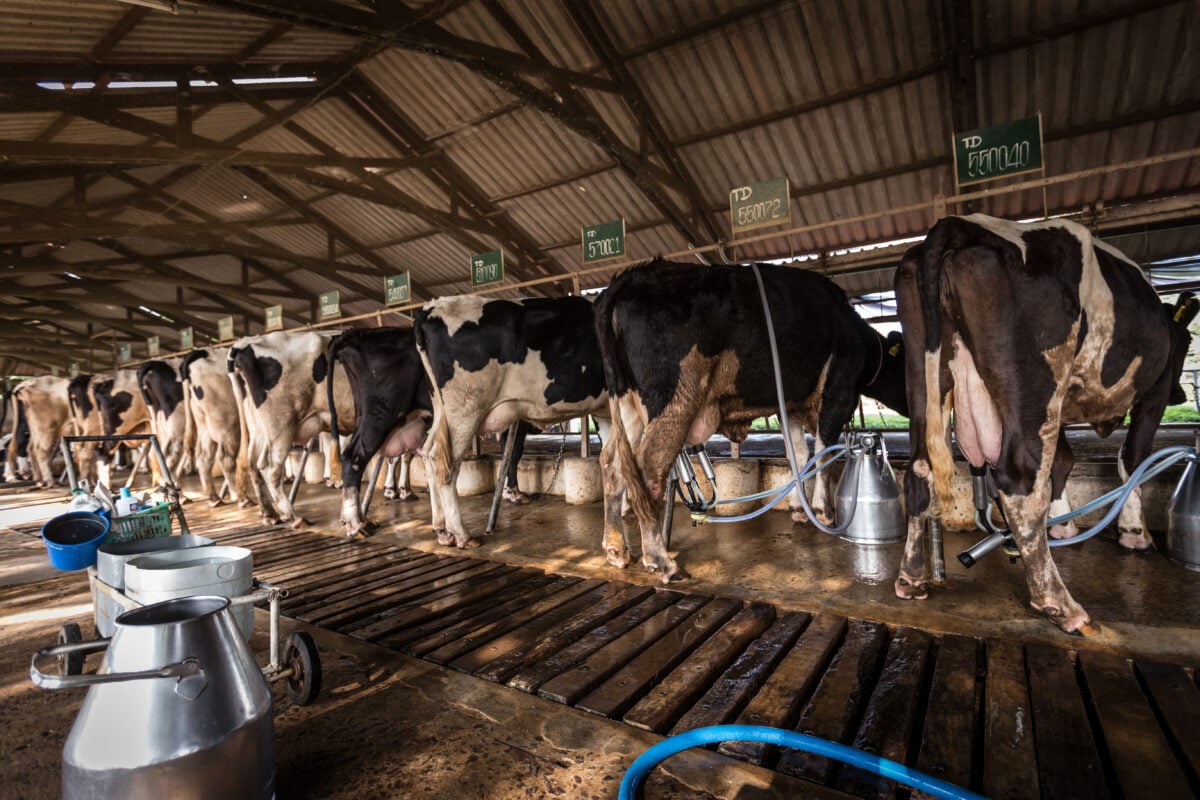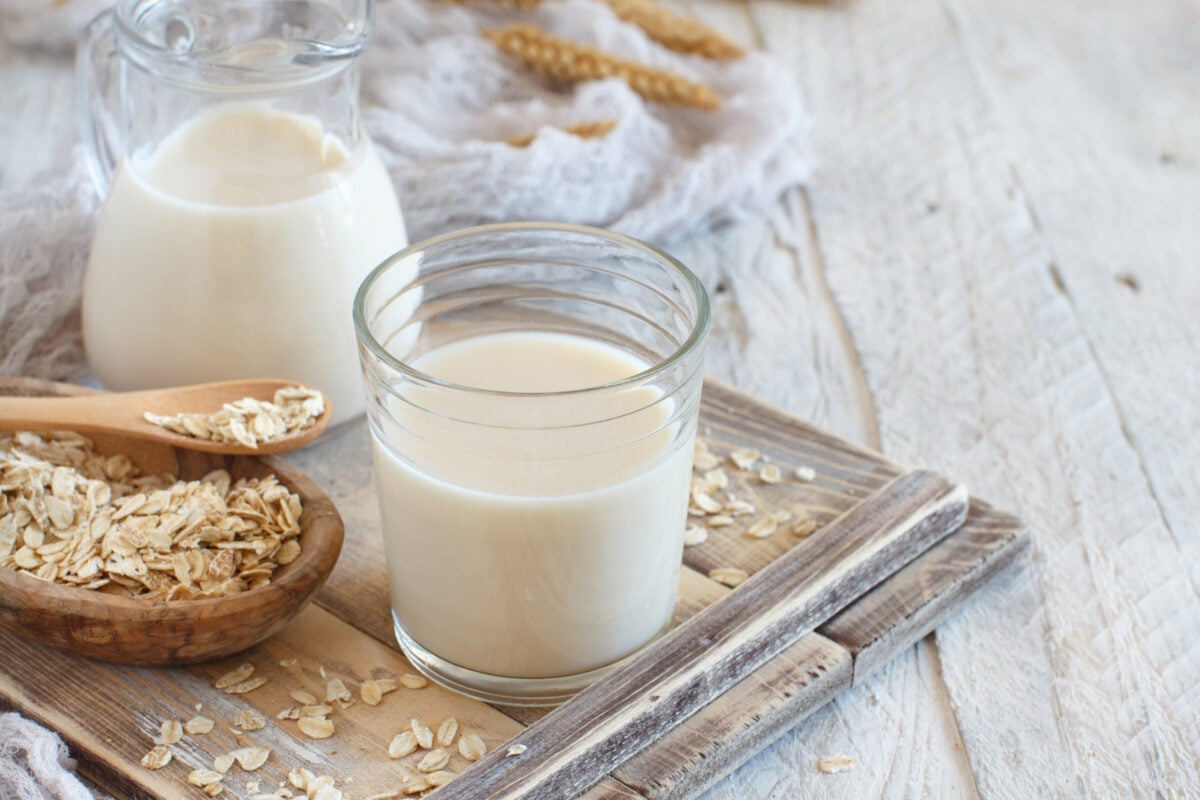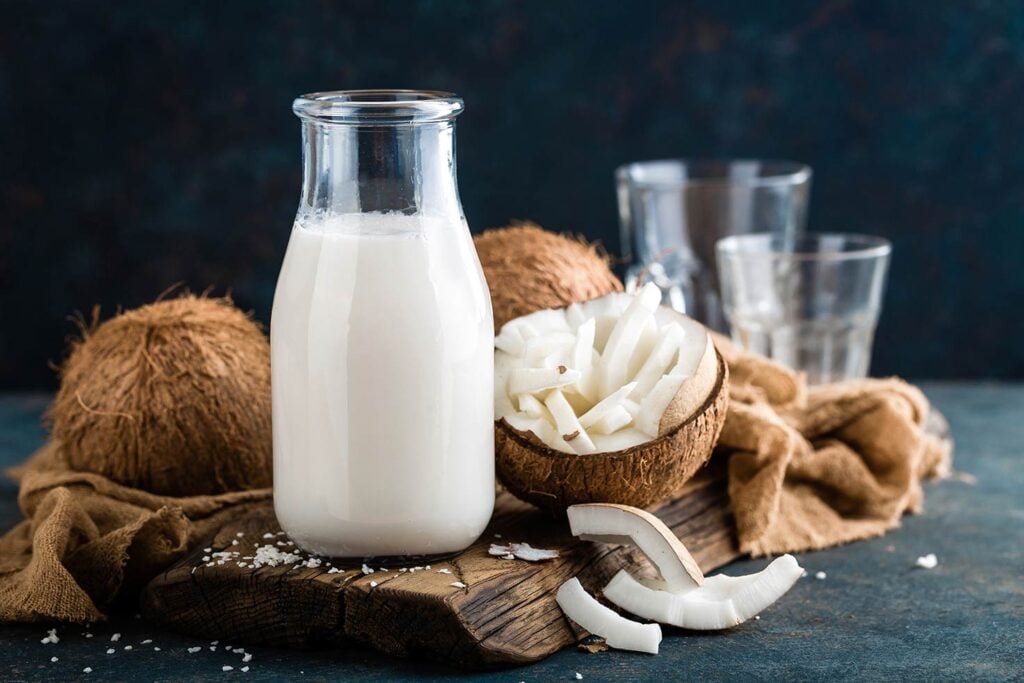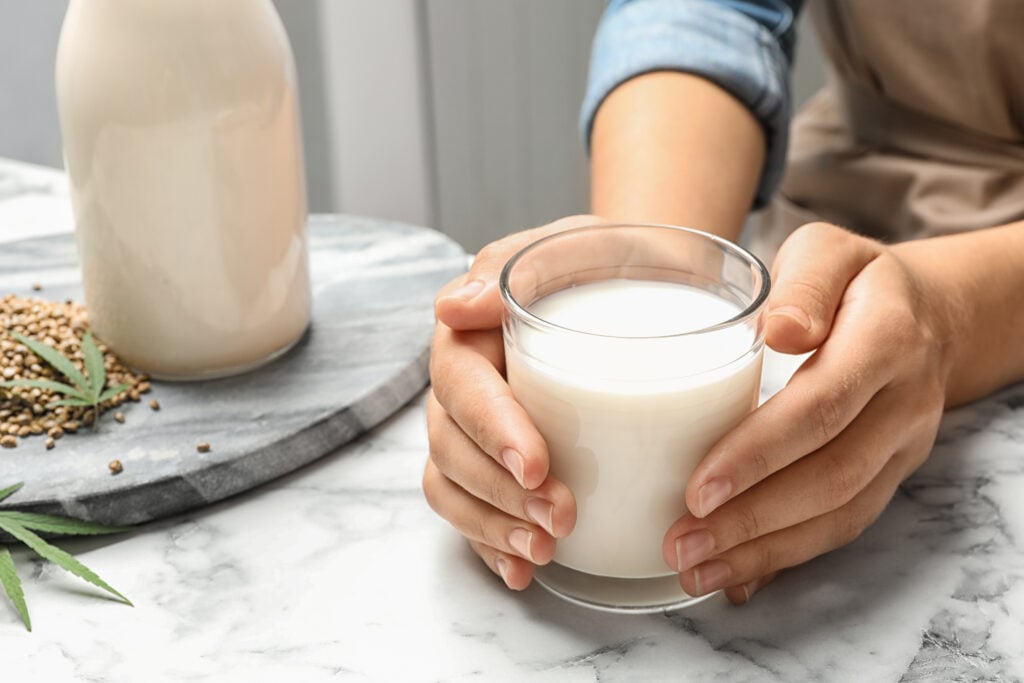Vegan and dairy-free coffee-lovers are spoiled for choice of milks these days. Plant-based milk producers now pay close attention not just to taste but also to how well the milk froths and blends with hot shots of espresso.
The perfect dairy-free milk partner for coffee should complement the flavors of the espresso. It should also contain enough protein and fat to ensure that, if you steam it, the foam is thick and smooth.
So which one is the best? Is it creamy oat milk, old faithful soy milk, or new kid on the block pea milk? Here is our round-up of the best options to help you create the perfect coffee beverage.
Why choose dairy-free milk
If the welfare of animals is at the forefront of your mind, dairy-free milk is the right choice. Plant-based options are better for the planet too.
How dairy harms animals

Dairy production involves a cycle of forcibly impregnating cows and removing their calves from them shortly after birth so their milk can be taken and sold. This is known to cause distress to both mothers and calves.
As the dairy industry has no use for male calves, they are often shot in the head at one day old. This practice is now prohibited in the UK on most farms due to rules recently imposed by retailers and farm certification scheme Red Tractor. But calves are still being slaughtered after being sent off to calf dealers.
Some countries ship surplus calves from the dairy industry thousands of miles away to be slaughtered abroad. Ireland exports hundreds of thousands of calves across Europe each year to be reared for veal on journeys lasting as long as 61 hours.
Environmental impacts
Across all metrics, dairy milk is worse for the environment than plant-based alternatives. It requires ten times more land than oat, soy, almond, or rice milks, which require relatively very little.
Dairy emits three times more greenhouse gases than rice milk, the most emissions-intensive alternative. It uses almost double the amount of freshwater as almond milk, and creates almost double the amount of water pollution as the worst plant milk offender – again rice milk.
Compared to each other, plant-based alternatives have varying impacts across the different metrics. Almond milk has lower emissions compared to oat, soy, and rice, while soy requires the least water and causes the least pollution.
But the available research hasn’t assessed every kind of plant-based milk on the market. Now that there is also hemp, pea, and potato milk, one might yet emerge more clearly as the environmental winner.
Is plant-based milk healthy?
The nutritional value of plant-based milk varies between different types and different brands.
Soy milk and pea milk are high in protein, comparable to cow’s milk, and are low in fat and sugar (if unsweetened). Milk alternatives made from soy, nuts, or seeds are high in heart-healthy unsaturated fats.
Some plant-based milks are fortified with nutrients including calcium, iodine, and B12 to help meet nutritional needs. A recent study found that swapping dairy for nuts and legumes is associated with a lower risk of cardiovascular disease. But the researchers noted that there needs to be further investigation of this in relation to different types of dairy products.
The best dairy-free milks for coffee
You can use any plant-based milk you like in your coffee, but to get a good froth it’s best to use a barista-grade blend. Many dairy-free milk brands now make these and they will be used in many coffee shops. Barista milk has a higher fat content, which may be added through gums or lecithins, or occur naturally in nut milks.
Pea milk
Pea milk is a relative newcomer to the plant-based milk scene. It’s not made from the green garden peas like the ones in your freezer, but from yellow split peas. They are high in protein and a good source of iron and vitamins A, B, and C. Researchers have even begun making cheese out of these mighty legumes.
As for it’s coffee-making qualities, pea milk is creamy and doesn’t separate from a hot shot of espresso. The taste can take getting used to, but being mild it works well with different types of coffee beans. Farrer’s Tea & Coffee Merchant ranks it number one for coffee beverages among dairy-free milks for its excellent steaming quality.
Mighty’s Unsweetened Pea M.LK (UK) is a popular option. In the US, Ripple is an old hand at making pea milk which boasts 8 grams of protein per serving.
Soy milk
Soy milk has been available as a dairy-free alternative for longer than most other types of plant-based milk. It has a slightly sweet, nutty flavor and froths well because of its high protein content. It can curdle if the coffee is too hot, but is a reliably good option for your latte.
Silk Soy Milk (US) or Alpro Barista Soya (UK) are popular choices. British consumers can get now get barista soy milk by Good Company delivered straight to their door in returnable glass bottles.
Oat milk

Oat milk has become hugely popular; it was the best-selling type of plant-based milk in the UK in 2020. It’s creamy texture and mild flavor make it perfect for coffee. For those trying dairy-free alternatives for the first time, the taste of oat milk can be easier to adapt to than nut or legume-based options.
Oatly Barista Edition (UK and US) often tops lists of plant-based milks for coffee.
Almond milk
Almond milk has a distinctive nutty flavor which can overpower some coffees. It is often fairly thin in texture and can separate after steaming, but it creates a pleasingly silky foam.
Pacific Foods Barista Series Almond milk (US) is recommended for its dense foam and nice almond flavor. Almond Breeze Barista Blend (UK) holds its foam for a long time and doesn’t separate from the coffee.
Coconut milk

As you might expect, coconut milk will give your coffee a distinctly coconutty flavor, which is not to everybody’s taste. Coconut milk can also be quite thin and does not foam so well because of it’s low protein content.
Alpro (UK) does a coconut soy barista blend that will deliver the coconut taste with some of the foaming qualities of soy milk. In the US, try Silk Original Coconut Milk.
Hazelnut milk
Hazelnut is a good flavor pairing with coffee, but in milk form it can be a little bitter. It also has a thin consistency and doesn’t foam well as it has low protein and fat content.
Elmhurst Mixed Hazelnut Milk (US) is popular for its simplicity – it’s made only using hazelnuts and water. Plenish Hazelnut Drink (UK) has a similarly short ingredient list, adding only sea salt to the hazelnut and water blend.
Hemp milk

One of the more unexpected bases for a plant-based milk is hemp. Hemp milk is made from ground up hemp seeds, which are full of omegas 3, 6 and 9. Though hemp is low in protein, its content of healthy fats makes it foam well. It’s particular, nutty flavor might take some getting used to.
Good Hemp Seed Milk (UK) is recommended for a smooth cup of coffee. Pacific Foods Hemp Milk (US) is popular for its creamy texture and good nutritional value.
Rice milk
Rice milk has been around a long time. It can be quite watery and has little protein or fat. Its mild flavor means it goes well in coffee without overpowering. But as it doesn’t froth well it is better suited to being added as a splash of milk to a black coffee.
Rice Dream Original (UK) is a popular option, as is Better Than Milk’s Rice Drink (US), which is fortified with calcium.






